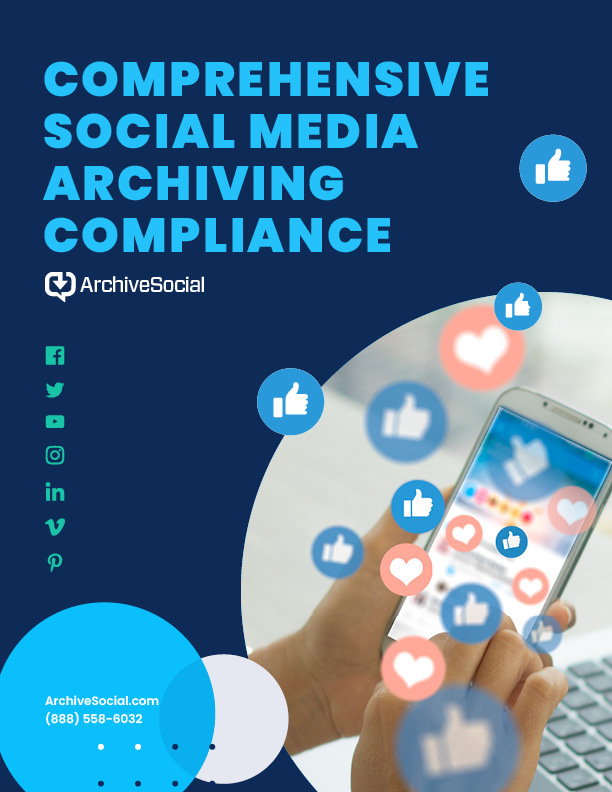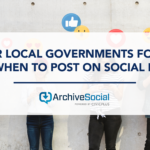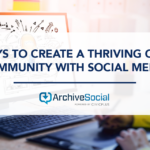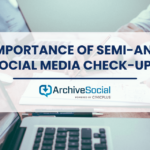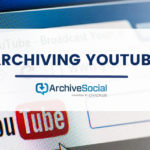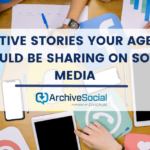We at ArchiveSocial often hear patterns about the issues that government and education communicators are having. And what better resource to solve some of those issues than to hear from other communicators about their experiences and lessons learned? So, we turned to some of the best and brightest people we know, our customers! As part of this new spotlight series, we reached out to customers across the country to hear their stories and share their best insight to help others gain a bit more understanding about their position, the strategies they use, and personal opinions on government and social media!
Katie Nelson
Agency: Mountain View Police Department
Position: Social Media + Public Relations Coordinator
Our February customer spotlight focuses on Katie Nelson. Recently appointed PIO Section Secretary for the International Association of Chiefs of Police (IACP) Katie speaks across the country on social media best practices, crisis communications and forming positive working relationships between law enforcement and the media. As part of her role as the Social Media and Public Relations Coordinator for Mountain View PD, Katie creates strategies to help the department engage with different residents on a multitude of platforms. She even shared some of her insights as a speaker in our Agency to Agency webinar series. You can check out the slide deck here.
- How did you get into public affairs and social media in government?
When I was 22, I went on my first ride along with a police department that I was covering as a journalist out in the Central Valley in California. I quickly realized I was in the wrong line of work. Fast forward five years, and I met Captain Hsiung with the Mountain View Police Department, an agency I was covering as a reporter at the San Jose Mercury News. He presented me with the opportunity to join the department as the social media and public relations coordinator. To this day, this is the best job I have ever had, and probably will ever have. It combines my love of how social media can do good for communities with the ability to connect with residents and media members alike.
- What does a typical day look like for you?
A typical day for me is atypical. That’s the beauty of this job. No two days are the same. My priority every day is to ensure the department stays connected with our city’s residents, and with our audiences online who have questions, comments, or concerns. Our goal always is to ensure that folks know MVPD is available and that if they reach out, they will be heard.
- How do you stay organized when helping manage and maintain your social media accounts?
This isn’t a job where you can necessarily plan long-term. I have a weekly calendar where I sit down and plan out evergreen content for our pages, with the understanding that if major news comes up, we can quickly and efficiently substitute that content. Our efforts revolve around brand management and ensuring that our priorities when it comes to transparency and accountability are not only managed, they are always at the forefront of our efforts.
- What makes social media different in government?
Digital risk management is probably one of the most critical components about government social media. This isn’t just a job where you can bypass negative commentary, refuse to answer or address questions about financial accountability, etc. Government social media must *always* think about how they message, why that impacts their community, and how that will reflect on them as an organization both in the near future and years down the road. What you do online lives forever. Government social media must be a conduit for all, not just some. Government represents all people, therefore we must message and manage our social feeds as such.
- What is your favorite thing about using social media for government?
I love that we are moving in a direction to change the narrative of what “traditional” government is perceived to be — slow to respond. We are present 24/7 online, and I love that our audiences know that they can reach out any time, and receive a timely response, support, and more from us.
- What advice would you give someone just starting out their career in public affairs?
One thing everyone must remember when they start out here — have fun. This job can and does become overwhelming at times, but when things calm, and you are able to reflect, if you still love this, and you love what you do, and you are having fun along the way, that’s what matters. Because, what you feel is reflected in your posts, videos, and images. How you capture your department or agency, and the emotions that come with that, will inevitably transfer to your audiences.
- What was the driving force in deciding to archive your social media accounts?
Public records laws! We want to ensure that we are continuing to live up to the expectation set forth by both lawmakers and journalists (who can also be our community members) that we do all we can to be transparent and accountable.
- What are some of the places you like to visit in your city during your free time?
I don’t live in the same city in which I work — which is a total bummer! — but I am a sucker for libraries. Every city I have ever lived in or worked in, the first thing I do is I go to the library and get myself a card. I’m no stranger to bookshelves, and I have recently fallen in love with Mountain View Library’s ability to allow me to check out and easily listen to audiobooks on my phone.
- Where do you see social media heading in the future for government?
First and foremost, this is *not* a fad or phase for government. Increasingly, if you and your agency do not join online communities, you will increasingly become obsolete, and your story will be told by someone else. You’re the subject matter experts, get in there and get your voice heard. In the next five years, I see an increasing divide between the haves and have nots – those who have social media and are able to drive audiences and community members to connect with them in a digital space — and the have nots — the ones who aren’t able to connect online and as a result, are seeing an increasing inability to even be heard by the people who matter most — their community. You can’t just get by on “what has been done” anymore. You keep that up, and you’ll disappear.
- Lastly, at each employee’s first day at ArchiveSocial, we are asked to give a fun fact about ourselves. So, what is a fun fact that people don’t know about you?
A fun fact about me is that I have no fun facts about me.
We think it is always fun hearing Katie! You can follow Katie’s work @MountainViewPD and see more insights by following her @katienelson210 on Twitter.
If you would like more resources or want to get updates about future spotlights and webinars, subscribe to our emails to hear all the latest news happening at ArchiveSocial.



